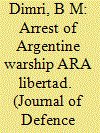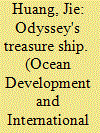| Srl | Item |
| 1 |
ID:
121080


|
|
|
|
|
| Publication |
2013.
|
| Summary/Abstract |
The ARA Libertad Case (Argentina v. Ghana) is the first instance where the International Tribunal for the Law of the Sea (ITLOS), Hamburg, Germany considered the issue of the release of a warship which was detained in a foreign port contrary to the principles of sovereign immunity of warships. The Argentinian warship was detained based on a commercial case filed by an American hedge fund against Argentina in the Ghanaian Court. According to the Court, Argentina had waived sovereign immunity in respect of the claims of the bondholders and, therefore, the warship could be arrested for execution of a monetary claim. This article examines the ITLOS order at the backdrop of warship rights and duties under the International Law of the Sea.
|
|
|
|
|
|
|
|
|
|
|
|
|
|
|
|
| 2 |
ID:
139524


|
|
|
|
|
| Summary/Abstract |
Customary international law (CIL) is a fundamental source of international law. But scholars lack a clear understanding of customary international law, as well as systematic statistical analyses of its workings. Existing theories posit that CIL is a cooperative equilibrium that can be sustained through reciprocity. Yet, CIL lacks institutional features that facilitate reciprocity and is commonly understood to apply universally, even to states that defect or reject a norm. Because the continued existence of CIL depends on state practice, the potential precedential effect of defection encourages cooperation as long as states value the cooperative norm. Consequentially, a state's decision to apply a CIL norm should be a function of the extent to which the norm is practiced in the community of states it interacts with rather than the past behavior of the specific state in an interaction. We test the implications with newly-collected data documenting if and when 121 states switched from absolute to restrictive foreign state immunity. We find no evidence of direct reciprocity. States that most valued absolute immunity and whose defection would most affect others were least likely to defect, but states became more likely to defect as the states whose practice most affected them defected.
|
|
|
|
|
|
|
|
|
|
|
|
|
|
|
|
| 3 |
ID:
047144


|
|
|
|
|
| Publication |
Newport, Center for Naval Warfare Studies, 2000.
|
| Description |
xvii, 364p.
|
|
|
|
|
|
|
|
|
|
|
|
Copies: C:1/I:0,R:0,Q:0
Circulation
| Accession# | Call# | Current Location | Status | Policy | Location |
| 044689 | 344.046/BOE 044689 | Main | On Shelf | General | |
|
|
|
|
| 4 |
ID:
121482


|
|
|
|
|
| Publication |
2013.
|
| Summary/Abstract |
Odyssey Marine Exploration, Inc. v. The Unidentified Shipwrecked Vessel is a recent controversial case decided by U.S. courts concerning a Spanish historic shipwreck on the high seas. This article analyzes the case and its implications from three aspects. First, the different laws applicable to shipwrecks reflect diversified approaches to the preservation of shipwrecks on the high seas. Second, compared with the U.S. Foreign Sovereignty Immunity Act and the UNESCO Convention on the Protection of the Underwater Cultural Heritage, the UN Convention on Jurisdictional Immunities of States and Their Property better defines "commercial activity" by using the nature of the transaction as a primary criterion and its purpose as a supplement. Moreover, warship wrecks and the cargo on board are inseverable for sovereign immunity purposes. Third, a legal vacuum exists for the protection of a former colony state's legitimate interests over a historic shipwreck.
|
|
|
|
|
|
|
|
|
|
|
|
|
|
|
|